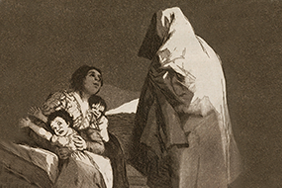We recently interviewed M.F.A. in Playwriting candidate Jaymes Sanchez about winning the prestigious Keene Prize for Literature (College of Liberal Arts, The University of Texas at Austin). Sanchez was recognized for his script The Cucuy Will Find You, a play that incorporates Mexican-American folklore to address the tensions between traditional and individual identity faced by Latinx millennials. The Keene Prize, awarded to an undergraduate or graduate student every year, earned Sanchez $50,000 for his creation of a work that exemplified the future of American literature and, as Mr. E. L. Keene said when establishing this prize, provided a “vital portrayal of the American experience in microcosm.”
 Can you tell me a bit more about yourself and your background? What drew you to playwriting?
Can you tell me a bit more about yourself and your background? What drew you to playwriting?
As most playwrights do, I started out as an actor. Even though I started writing plays in college, I still identified primarily as an actor through my early twenties. I got into writing because the vast majority of the plays in the theatre canon didn’t interest me or have space for me in their world. I’m a brown-skinned Latinx person from a working-class environment in San Antonio, Texas. From there I went to a highly privileged college in New England. I realized there that theatre as an industry and as an American subculture is very white and affluent. I found it difficult to access even though I had been in plays off and on since middle school. I felt like I was always at the fringes so I decided to write plays that focused on the communities and truths that are important to me.

Tell me more about The Cucuy Will Find You. Can you give me a brief synopsis of the work?
The Cucuy, in Mexican-American folklore, is a monster that eats bad children. But what does it mean to be a good child? For a seven-year-old it means shutting up every now and then. For adults, the answer is more complicated. In this play, Rey is a surgeon who has a difficult family history and lives far away from home. When the Cucuy shows up and disrupts Rey’s life, and the very fabric of reality, Rey must prove that he is a good child, or be consumed by the Cucuy.
What has been your development process for this piece? Where did the idea come from and how has it evolved over time?
The inspiration for this play came from being a Texan living far away from home for a long time (I lived in New England for ten years starting with college). It made me feel a lot of guilt and uncertainty about what I “should” be doing with my life. This play is also a sort of eulogy for my grandparents, who passed away at the end of 2017. Through my own grief and talking to other people about their grief, I discovered that so many people question whether they had done enough or been good enough for their departed loved ones. The near universality of that feeling fascinated me. And I realized that culture complicates it even more. I think Mexican-American/Latinx millennials in the U.S. are in a uniquely difficult position. We are often torn between old-school Latin-American and indigenous ideas of collective responsibility and the more individualistic ambitions of the American dream. It’s an impossible balancing act, and it’s easy for a person to feel like they’re not following either ideal well enough. I want this play to portray the reality of living in that tension.
I started writing the play in mid-2017 but didn’t finish the first draft until about a year later, for various reasons. I did some work on it as a member of the Playlab Fellows at Company One in Boston. I made some major breakthroughs on the play when I took it to the Lark for Playwrights’ Week. Most recently I workshopped the play with Teatro Vivo here in Austin as a part of the Latinx New Play festival.
What is it about this work in particular that you think is important for audiences?
I hope that there is something universally accessible and universally engaging and cathartic about how the play deals with the weight of familial responsibility and everything attached to it. But even without that, representation matters. All of the characters are people of color and most of them are darker-skinned Mexican-American Texans. The theatre world needs more stories by and about people of color. We need stories that portray these communities with humanity, without tokenizing or fetishizing their identities or problems.
Is there a certain subject matter or type of work you hope to create going forward? What inspires your writing?
I’m interested in: stories about people of color and the urban working class, stories about what happens when people from low privilege communities gain access to high privilege communities, characters who are smart but not traditionally educated, using surreal or magical elements to communicate something true about the real world, using humor to communicate rage. I think what inspires me the most is the desire to create space in theatre for myself and people from communities like the ones I call home. I look around at the theatre world and pop culture and see more misrepresentations and stereotypes than anything else. Our stories are important and I want to be part of the growing number of POC writers who are bringing these stories to life.
We also want to share a heartfelt congratulations for being recognized for such a prestigious award! What’s next for this work and your future projects?
The next thing for this play is the San Diego REP Latinx New Play Festival this fall. The pandemic will probably decide when any next steps happen for this play, but I am hopeful. Aside from that, I have a few different projects that I’m working on writing here at The University of Texas at Austin.
Learn more about Jaymes Sanchez’s work here.

